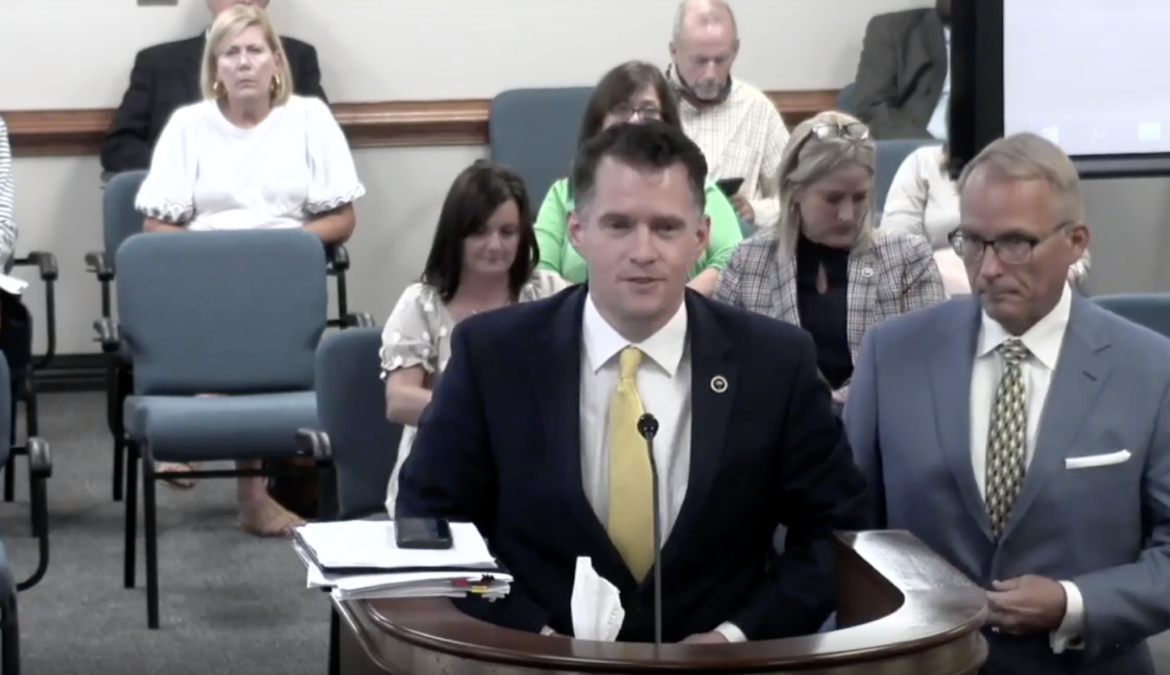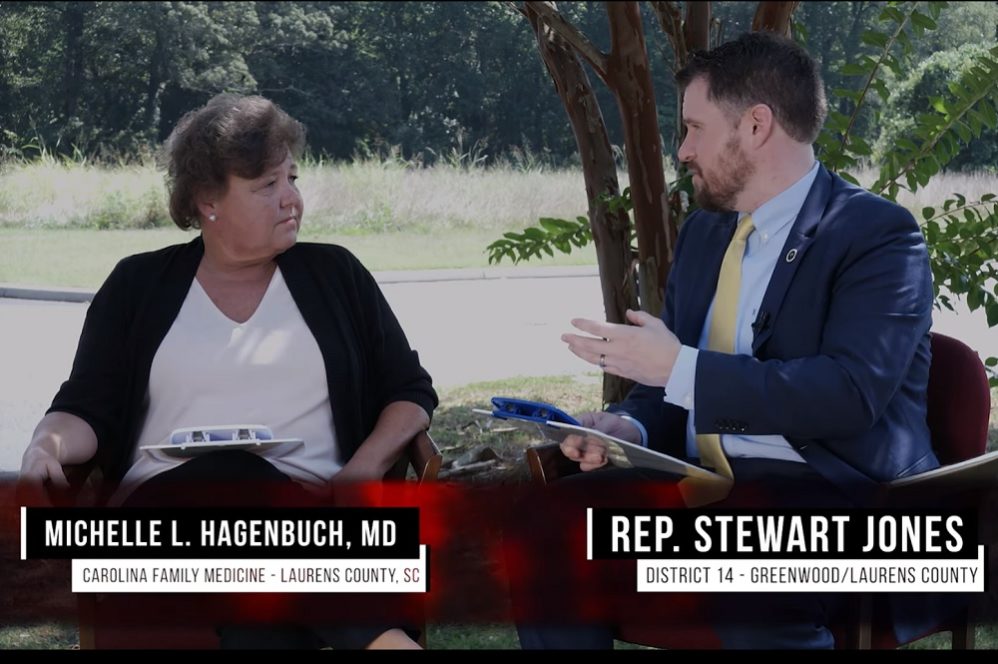https://discourse.wecansc.com/t/rep-stewart-jones-testimony-to-senate-medical-affairs-committee-on-covid19-treatment-reform/1318
Category: Medical freedom
Politics is Locking Up a Successful COVID Treatment
Because of government intervention, ‘Physicians are afraid to speak out, they’re afraid to share their experiences of treatment. They’re afraid to prescribe HCQ.’
The great economist Milton Friedman once wrote, “Underlying most arguments against the free market is a lack of belief in freedom itself.” These words not only hold true, but have gained even more relevance since Friedman wrote them in 2002. Freedom has been under siege since the arrival of COVID-19 on American soil. Greater than the crisis of the virus is the crisis of big government.
From forced quarantines of healthy people, to business shutdowns and mandatory mask ordinances, the government “cure” to COVID-19 will be studied for ages to come. Fear is an incredibly powerful phenomenon; it has played the greatest role in bringing these draconian measures to life. Yet it is precisely in times of crisis and panic that we should seek most to exercise reason, rather than succumb to our fears.
Bureaucracy and government regulations have played a key role in stoking COVID fears. The consequences of excessive regulation from the Food and Drug Administration and Centers for Disease Control have been repeatedly made clear with controls on getting tests, restrictions on what medicines can be used, and countless arbitrary treatment protocols.
During a press conference in March, President Trump said that hydroxychloroquine (HCQ) had been federally approved, as it’s shown “very, very encouraging results.” He noted, “Normally the FDA would take a long time to approve something like that…” speaking about the FDA’s control of medicine. Even the president has taken the treatment as a prophylactic.
Some positive studies were shown using HCQ in combination with azithromycin, and a steroid pack with zinc to combat symptoms of COVID-19. Yet the FDA immediately contradicted Trump’s statements, saying it was conducting clinical trials. The South Carolina medical board issued a joint statement on March 25 discouraging the prescription of HCQ to patients, not in a hospital.
Many states began purchasing stockpiles of HCQ. Then on June 15, the FDA revoked the emergency use agreement for HCQ and chloroquine, citing “serious cardiac adverse events and other potential serious side effects.” There have been patients and doctors trying to speak out about the success of this drug in treating COVID-19. Sadly, many are being silenced by special interests and those who wish to maintain control through fear. In today’s climate of cancel culture, even treatments outside of hospital systems are being canceled.
I recently sat down to discuss the potentially life-saving effects of HCQ with Dr. Michelle Hagenbuch of Laurens County, South Carolina. Regarding the State Board of Medical Examiners guidance, she said that “it put more pressure on physicians when it said that you had to put the COVID diagnosis on that medication. In South Carolina, we do not have to actually tag a diagnosis to a medication to a drug. So, I thought that put added pressure and seemed inappropriate.”
Because of government intervention, “Physicians are afraid to speak out, they’re afraid to share their experiences of treatment. They’re afraid to prescribe HCQ because of the order that was placed.” This along with the added pressure from the FDA, has made it more difficult for physicians to help COVID-19 patients recover.
“We have to have freedom as doctors to use our experience, education, and training to treat each individual patient,” she said at one point in the interview.
One of the most fascinating examples Hagenbuch shared is a case with identical twins in their fifties. Both were diagnosed with COVID-19 around the same time. The twin who was prescribed the combination of HCQ, azithromycin, and zinc improved by 85 percent within 48 hours of taking the first dose, while the other twin who did not have HCQ is still battling COVID-19.
HCQ has a long history and “is on the WHO list of essential medicines.” As Hagenbuch said, “In 2017 it was the 128th most commonly prescribed medication with over 5 million prescriptions in the United States alone. So, obviously this is a well-used, known medication.”
Hagenbuch has had “very good success” and “never had any problems with side effects at all” with prescribing HCQ to patients with COVID-19 and previously for other uses. Many other physicians and patients are reporting successful stories using hydroxychloroquine to beat COVID-19: “It was interesting the CDC says HCQ is completely safe to give to pregnant women or nursing women. Now all of the sudden it’s like it’s the Black Death.”
Part of the problem is that governments have restricted the use of HCQ for COVID-19 purposes to inside hospitals only. According to Hagenbuch, “I’ve been in practice for 25 years, part of my goal is to keep people out of the hospital. I think it is counter-productive to say ‘just do whatever until you get sick enough to require hospitalization.’ In this day and age, we have lots of different weapons available to hopefully keep people out of the hospital.”
Regarding “side effects” being reported by the FDA, Hagenbuch said, “One of my issues with the trials in the hospitals is that they’re using ten times the usual dosages that we use to treat lupus or rheumatoid arthritis. So, let’s take a very common medication like amoxicillin, if I give you ten times the usual dosage of amoxicillin, do you think you might get sick from it? It’s a distinct possibility.”
There is a mountain of positive data and peer reviews showing HCQ’s effectiveness as “extremely positive” as a prophylactic and taken in the early stages with “slightly negative to positive” in the late stages of COVID-19. Once people are in the hospital they are usually in a bad stage. Once they’re put on a ventilator, their chance of recovery becomes less likely. This is why government orders in some states are problematic. They only allow HCQ as a treatment for COVID-19 once a person is admitted to a hospital.
Government not allowing HCQ to be used to combat COVID-19 is the perfect example of why government control of medicine is dangerous. The medicine is prescribed for other ailments, but it’s somehow not for COVID-19.
The question we should be asking is why do the government and big pharma discourage the use of safe, widely tested, and inexpensive medicines like HCQ, especially in the face of such staggeringly positive results? Not only is it safe, but it is also affordable at $37 per 100 pills.
By issuing orders and mandates like that issued in my state, government at all levels continues to limit innovation and freedom for the people who need them most right now. As Hagenbuch says, “One size fits nobody!’
I believe she’s absolutely right. Maybe more people could beat COVID-19 and perhaps many other issues if the government would just get out of the way. Sign the petition to demand freedom in medicine.
Originally appeared in the Federalist.
How the Market is already Repealing Obamacare
If we bypass the government regulations and laws on health care, more people would get better service at a more affordable rate.
There’s a common misconception that if you’re opposed to government services, programs and/or departments, then you’re opposed to building roads, education, people getting affordable health care and even people taking care of the sick and elderly. These misconceptions are becoming more apparent as the free market offers solutions and options using innovation and technology, as the government continues to fall in on itself.
Six months into the pregnancy, we received a letter explaining that due to the changes in the law, our policy would no longer cover maternity services.
I continue to be amazed at the ingenuity of people and individuals working toward solutions in the marketplace, in spite of government. Over time government has assumed more and more control over medical decisions that individuals make everyday.
My Own Experience
I have paid my dentist out of pocket for many years and had private insurance for major medical only. In 2011, my wife and I were expecting our first child and had private health insurance which was slowly being limited more and more by regulations from the Affordable Care Act and Patient Protection Act. It was dreadful!
Six months into the pregnancy, we received a letter explaining that due to the changes in the law, our policy would no longer cover maternity or OB-GYN services. This meant that our insurance would no longer pay for anything related to the birth of our daughter. We searched and shopped for insurance that would help cover the cost of the hospital and birth, but the more government regulations and controls were placed on the market, the more difficult it became to actually get affordable medical insurance and health care.
We spoke with our doctor about it and found that by avoiding insurance altogether and paying the doctor directly, it reduced all costs associated with pregnancy by 60%. We avoided the government-burdened insurance market and paid the doctor directly.
This model of doctors and patients actually working out agreements and paying a flat fee in exchange for medical services is actually very effective. If we could only bypass the government regulations and laws on health care, more people would get better service at a more affordable rate.
Market-Based Medicine
One awesome example of markets finding ways around the government’s stronghold on medical services is the Surgery Center of Oklahoma. In order to run their own practice with the least amount of government interference as possible, two doctors formed this practice 15 years ago. The goal was to eliminate the inefficiencies that accompany hospital networks and Medicare/Medicaid networks in order to run their own practice. The practice has done so well, that it has grown to over 40 doctors now.
It is no secret to anyone that the pricing of surgical services is at the top of the list of problems in our dysfunctional healthcare system. Bureaucracy at the insurance and hospital levels, cost shifting and the absence of free market principles are among the culprits for what has caused surgical care in the United States to be cost prohibitive. As more and more patients find themselves paying more and more out of pocket, it is clear that something must change. We believe that a very different approach is necessary, one involving transparent and direct pricing.”
This has allowed them the ability to perform the best quality surgeries at the lowest and most transparent cost. All of their procedures and costs appear on their website. By bringing this level of transparency to the public, it has forced a price war for surrounding hospitals to post prices for procedures, something that is often hidden. This has brought costs down in surrounding areas.
Exiting the rat race of hospital networks and eliminating acceptance of government payments has allowed them to cut the cost and provide a better service.
In spite of what government does, people around the country are finding ways to lower costs and raise quality in the most competitive and realistic manners.
Flat Fee Memberships
The difficulties with getting health care at affordable rates come not from marketplace inadequacies, but from government regulations.
Another great example, are physician’s offices like Irmo Primary Care, Gold Standard Pediatrics and many others that are starting flat fee pricing for memberships and monthly medical services called Direct Primary Care. These practices are helping to once again bring patients and doctors together without interference from government and bureaucratic middlemen. I love streamlining services!
Dr. Bryan Hill, a South Carolina pediatrician, opened his direct primary care practice in September. “Instead of accepting insurance for routine visits and drugs, these practices charge a monthly membership fee that covers most of what the average patient needs, including visits and drugs at much lower prices.”
It’s sad that most of the difficulties with getting good health care at affordable rates come not from inadequacies in the marketplace, but from the many regulations by central planners in government.
History has shown us that free-market forces have the ability to lower costs and increase quality while fostering new growth and innovation. It puts the power in the hands of consumers, where it should be. If government would just get out of the way, then the free-market can fix the problems with healthcare.




